Go and check out my previous blog on King Cambyses' descent into madness:
https://steemit.com/hive-133974/@oo7harv/cambyses-ii-the-mad-persian-shah-530-522-bc-part-2
DARIUS I
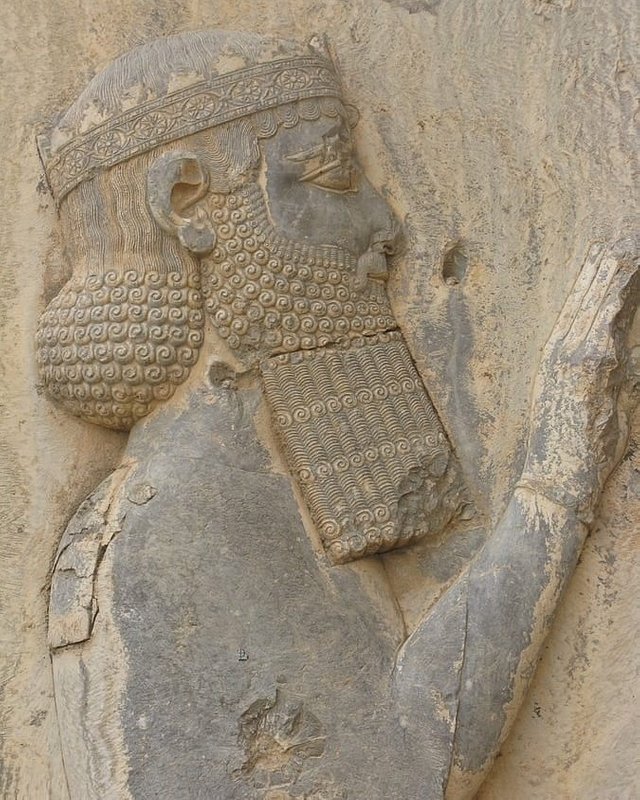
[ABOVE: Darius I as depicted on the Behistun inscription]
Known like Cyrus as “the Great”, Darius I (born in 550 BC) reigned from 522 to 486 BC, coming to the throne as Shah at the age of 28. During his reign, he proved to be a more than competent administrator and a brilliant general, taking the empire to its largest extent. However, his ascent to the throne is a story caped in mystery; it’s thought that he may have staged a coup to claim the kingship, with some of his people viewing him as a usurper and several others seeing his ascent as an opportunity to stage rebellions. In short, the line of succession from Cambyses to Darius is a very intriguing one.
THE MAGI REVOLT
While Cambyses was going insane in Egypt, two Magi brothers (a family with Median origins) staged a revolt against his rule. One of the brothers had previously been appointed by Cambyses himself to serve as steward of his household while Cambyses was away. He started the revolt after knowing that Cambyses had Bardiya murdered and tried to keep it a secret, even while most of the Persian people still thought he was alive. The other Magi brother happened to look a lot like Bardiya, and as it happened his name was also Bardiya, so the revolt plan was to have this lookalike be seated on the throne while Cambyses was away in Egypt, and then have messengers sent across the entire empire to all the armies to tell them to take their orders from Bardiya in Persia now, rather than the insane Cambyses in Egypt.
This message was also sent to Egypt. The messenger heading to Egypt found that Cambyses was in fact currently in Syria, in the Median city of Ecbatana, but he still delivered the message. This caused the paranoid Cambyses to think that Prexaspes, the man who he sent to murder the real Bardiya, had betrayed him, causing him to turn to Prexaspes and say:
"Is this how you carried out the task I set you, Prexaspes?"
"Master,” Prexaspes replied, “the man must be lying. Your brother Bardiya has certainly not rebelled against you. He’ll never defy you over anything, big or small. I personally carried out the mission you gave me and buried the corpse with my own hands - these hands here. If the dead are rising from their graves, you should expect Astyages the Mede to rise against you as well. But if everything is as usual, you need never expect any trouble from that quarter. Now it seems to me that we should track down this messenger and get him to tell us who sent him with his announcement about taking orders from King Bardiya.”
[Herodotus, 3.62]
Cambyses took Prexapses’ advice, and the messenger was eventually brought to Prexaspes for interrogation:
“You there! You say you came here as a messenger from Bardiya the son of Cyrus. Tell the truth now, and then you can leave without further ado: was it Bardiya himself who personally gave you your instructions, or was it one of his retainers?”
“No,” he replied, “I haven’t laid eyes on Bardiya the son of Cyrus since King Cambyses set out for Egypt. It was the Magus whom Cambyses appointed as steward of his household who gave me my mission and told me that the order to take this message to you came from Bardiya the son of Cyrus.”
This of course was true.
“Prexaspes,” Cambyses replied, “you are perfectly innocent. You acted properly and carried out your orders. But the question is: which of the Persians can it be who has usurped Bardiya’s name and is rising against me?”
“My lord,” replied Prexaspes, “I think I know what has happened. It is the Magi who have rebelled against you - Patizeithes, the one you left behind as steward of your household, and his brother Bardiya.”
[Herodotus, 3.63]
DEATH OF CAMBYSES
When Cambyses heard the name “Bardiya”, the truth of what Prexaspes had told him hit home, and he began to see the real meaning of his dream of Bardiya on the throne, becoming grief-stricken once he realised he had pointlessly killed his own brother. Sunk in grief, Cambyses went to mount his horse to travel to Susa to attack the Magi usurpers, but in doing so his scabbard came off, and the exposed sword cut into his thigh - ironically, he had been wounded deep in the same spot that he struck the Apis Bull. The cut was more than a scar - it was deep and fatal. When he learned that the Magi were at the city of Ecbatana, he worried for he had previously been told by the Oracle in Buto that he would one day die at Ecbatana. (This city was the then-administrative capital of Media, northern Iran, but the Oracle had meant another city named Ecbatana in Syria instead.) Hearing the city name again, he now became more sane:
“This is the place where Cambyses the son of Cyrus is destined to die.”
[Herodotus, 3.64]
After arriving in Syria, he sent for high-up Persian officials in Syria and told them of the dream, how he ordered Bardiya’s death in response and the regret he was now feeling. He begged the eminent Persians there, as a dying wish, to not let the Achaemenid throne fall back into Median hands, by force if necessary, hoping that if they were unsuccessful in doing so that all Persian men of the empire would die like he was about to. The Persian men handed over some of their clothing before giving in to their own griefs. Shortly after, Cambyses died childless, having ruled for 7 years and 5 months. However, the Persians present chose not to believe what Cambyses had told them; they assumed that Cambyses told them everything as a means of getting all of Persia embroiled into a war to fight Bardiya; they were instead certain that Bardiya, son of Cyrus, who had been made Shah. Prexaspes also denied the murder, since with Cambyses dead it was now dangerous for him to admit to being personally responsible for the death of Cyrus’s son.
"BARDIYA"
So following the death of Cambyses, the Magus ruled Persia without fear under his assumed name of Bardiya. He would rule for 7 months. His rule was a generous one, being kind to his subjects. At the start of his reign, he sent couriers to all of the empire’s tribes, telling them that they were exempt from taxes and military duties for 3 years. 7 months later though, his hoax became publicly known; a Persian noble called Otanes, the son of Pharnaspes, was among the first to suspect that this Bardiya was not actually the real son of Cyrus, guessing so as Bardiya never called for any Persians of any standing to his presence, and he never left the acropolis during his reign. Cambyses had once married Otanes’ daughter, Phaedymia, who at the time was married to the Magus, who had taken Phaedymia and all of Cambyses’ other wives. Once Otanes begun suspicions on Bardiya, he sent a message to his daughter, asking her who she was sleeping with. Her reply was that she didn’t know; she’d never seen the son of Cyrus so allegedly didn’t know who her husband really was. Otanes sent the following message in reply:
“Even if you yourself cannot recognise Bardiya the son of Cyrus, you can still find out from Atossa who it is that both she and you are married to. After all, she’s bound to know her own brother.”
She replied: “I can’t talk to Atossa or meet any of her handmaidens, because at the very beginning of his reign this man - whoever he is - separated us by assigning each of us different quarters.”
[Herodotus, 3.68]
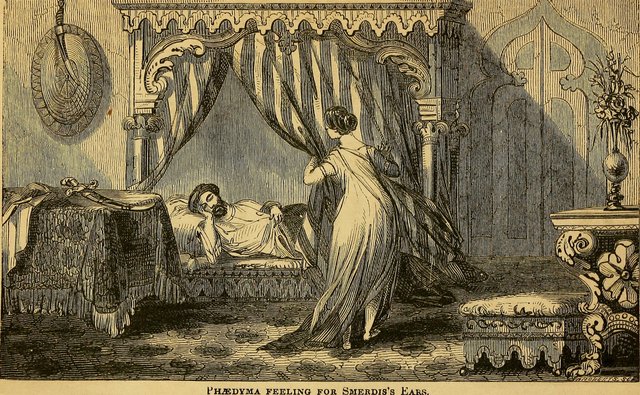
[ABOVE: Phaedymia checks for Bardiya's ear]
Otanes told her that her noble blood meant she must accept any risks he or her father gave her, for if this Bardiya wasn’t Cyrus’ son then he shouldn’t be allowed to get away with ruling as Shah and sleeping with her in the meantime; he should be punished. He told her that when they next slept together, she should wait for Bardiya to fall asleep then feel for his ears, telling her that if the man did not have ears then it was certainly the Magus and not the son of Cyrus; Cyrus had once punished this Magus brother for committing a crime by cutting his ears off.) She however thought that she would be murdered if caught by him, but agreed to do it anyway. Achaemenid tradition was that wives slept with their husband on rotation, one after the other each night. When it was her turn, she felt for his ears, and found that he had none; this Bardiya was a usurper Magus brother.
THE SEVEN
Otanes thus got Aspathines and Gobryas - close and trusted Persians who also had their suspicions - and told them everything. Otanes decided they should recruit another Persian to their side, the one he most trusted. Otanes recruited Intaphrenes, Gobrias recruited Megabyzus, Aspathines recruited Hydarnes, and it was here that Darius, Hystaspes’ son, arrived from Susa, where Hystaspes had been positioned as governor, and so he too was recruited. These men would go down in history to collectively be known as the Conspiracy of the Seven.
THE PLAN
When the Seven conferred, Darius said that he previously thought he was the only one to know of the conspiracy; He had arrived to where the rest of the Seven were convening to actually kill the usurper, stating that they should proceed immediately. Otanes replied, stating that while Darius was like his father, it would be better to take this with more caution, and at least wait for more conspirators to join, but Darius said that following Otanes’ advice would only get the Seven killed, as there would be more time for someone to come out and denounce them for personal gain; Since word of the usurper had already reached these seven men, it had likely reached others who could conspire against them. Action should thus, according to Darius, be taken immediately. Otanes demanded to know how Darius intended to get into the palace to overthrow Bardiya so quickly, to which Darius said that many things can’t be clarified by words but can be by actions, claiming getting past the palace guards via lies if necessary could be very doable as men of their position.
Gobryas spoke up next. He stated that there was no better time to attempt to regain power, since a Mede with no ears was their opposition. He sided with Darius, claiming that those among them who were with the dying Cambyses would remember how he had cursed any Persians who would fail to retake power. His speech turned all of the Seven to follow Darius’s advice and plan.
PREXASPES' FATE
While the Seven formulated their conspiracy, the Magi coincidentally made their own. They intended to win over Prexaspes’ loyalty; They knew of how Cambyses had previously treated him and killed his son, and they knew that Prexaspes had been responsible for killing the real Bardiya, son of Cyrus. Inviting him to a meeting, the Magi exchanged pledges and oaths and won Prexaspes over to their side, making him promise to not tell of how they were deceiving the Persian people, promising vast sums of money in return. The Magi then added that Prexaspes should gather all Persian subjects together and tell them that Cyrus’s son Bardiya was indeed on the throne, and no one else, thinking that the people would trust him more than they would trust Medians. Prexaspes did as was asked of him, but when he addressed the crowd, he instead ran through a list of Cyrus’s ancestry, then listing all of the benefits and glory Cyrus had brought to his new empire. He then told them of everything he had been made to do by Cambyses, and how the fake Magi Bardiya was now ruling the empire. No doubt knowing he would be hunted down by the Magi for this, Prexaspes threw himself from the tower he was addressing the people from, dying instantly.
CARRYING OUT THE CONSPIRACY
The Seven, meanwhile not knowing of Prexaspes’ death until halfway on their journey to the palace, decided to act immediately. Stopping at the side of a road to convene again, Otanes and his followers again put forward the idea of doing this cautiously, while Darius’s followers again argued for the more aggressive strategy. While they debated, several hawks appeared and began to chase and claw at some vultures. All being pious men, the birds’ aggression made the Seven all agree to keep following Darius’s strategy as they were.
Arriving at the gates, everything went pretty much as Darius had said it would. Respectful of the prominence of the Seven, the palace guards let the men through without asking a single question. The Seven then arrived at the courtyard and met the palace eunuchs whose job it was to take visitors’ messages directly to the king. The eunuchs threatened the guards with punishment for allowing the men in so easily, stopping the Seven from going any further. At a signal, the Seven drew daggers and killed the eunuchs, immediately running towards the main hall to confront the usurper Bardiya.
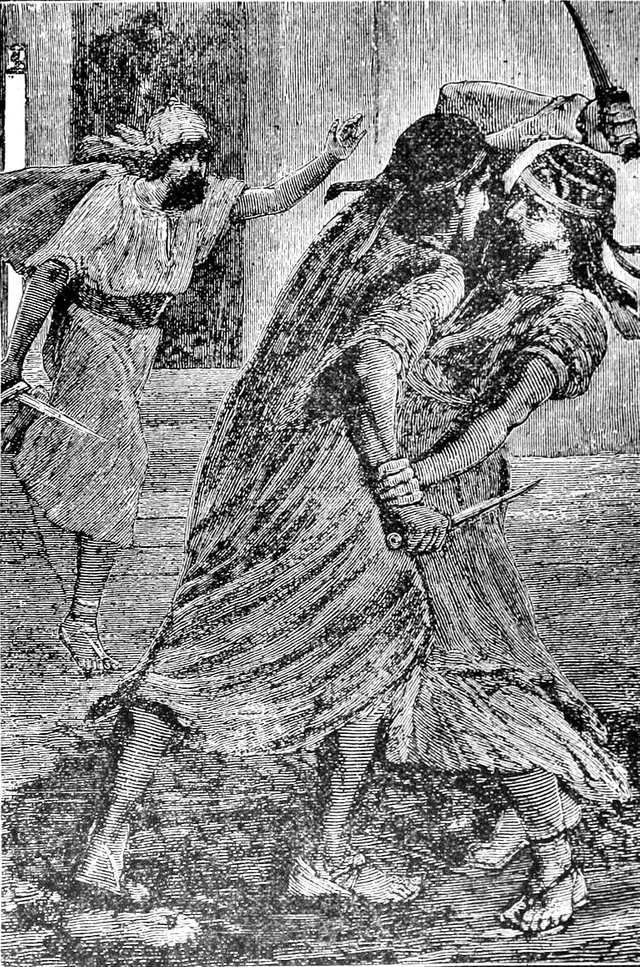
[ABOVE: "The Struggle Between Gobryas and the Fake Smerdis", by Jacob Abbott (1803 - 1879)]
The Magi brothers were in the palace at the time as it happened, discussing the aftermath of the Prexaspes’ incident. Seeing the eunuchs in fear and hearing their shouts, they jumped up immediately to get ready to defend themselves, one armed with a bow and arrow and the other with a spear. The bow proved useless as close-quarter combat arrived so quickly, while the spear managed to stab Aspathines in the thigh and slash out one of Intaphrenes’s eyes, although this wound was not fatal. The Magi brother with the bow ran to a bedroom, hoping to bar the door shut, but both Darius and Gobrias were too close behind him. Gobrias grabbed him while Darius stood by, watching; As the room was near pitch black, Darius claimed he was too worried about hitting Gobrias as he was struggling with the Magi brother. Gobrias yelled for Darius to just use his dagger, which he did, stabbing the Magi brother and not wounding Gobrias in the process. Once the brothers were dead, the conspirators decapitated the corpses and left the palace with the heads. Needing someone left to guard the palace they had just stormed, the Seven left the wounded members behind, knowing they would slow them down on their escape out of the palace and killing any Magi they came across in the process. The Seven called to the native Persians nearby and told them of what happened, showing the Magi brothers’ heads in the process and winning the Persians over in the process, themselves drawing daggers and assisting in cutting down more Magus.
This whole event was the most vital part of the Persian public calendar, celebrated in a festival called the Magophonia, during which no Magus is allowed outdoors for the entire day.
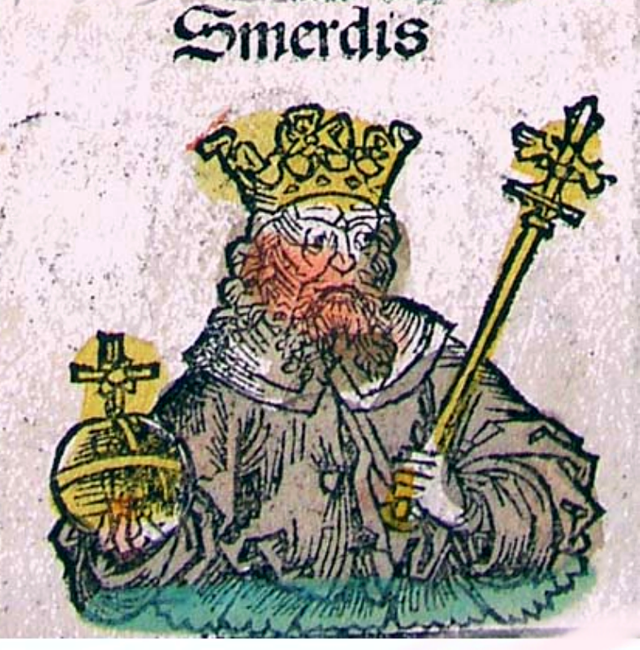
[ABOVE: A Medieval depiction of King Smerdis/Bardiya by Ranulf Higden (1280 - 1364)]
THE NEXT SHAH
Once things had calmed down five days after, the conspirators met. Otanes wanted to entrust the country’s management to the Persian people, wanting the system of a sole ruler to end, stating monarchy is neither noble or attractive after he’d witnessed what Cambyses and the Magi brothers did. Megabyzus however spoke in favour of an oligarchy; he said he shared similar views with Otanes on the abolishment of a monarchy, but disagreed that power should simply be handed over to the people. He argued that the people are a mob, too unruly or stupid to rule too soon after moving from a monarchy straight to mob-rule. The third proposal came from Darius, who agreed with Megabyzus’ opinion on mob-rule being too unruly, but disagreed with his opinion on an oligarchy. Darius laid out three choices were now laid out before them: democracy, monarchy or oligarchy. Darius said that the best form of monarchy beat the best form of the others, arguing that if the best ruler in the world was in charge then there would simply be no way to out-perform that. Darius argued that an oligarchy has too many people involved in it, and that personal feuds often take over in even the best of oligarchies, and that these feuds always lead to bloodshed between the competing families, with one ultimately claiming victory and taking power for themselves, thus a monarchy will emerge anyway. Darius also argued that democracies always lead to monarchies too, as rampant corruption is inevitable within a system of government where the masses have power, and thus alliance networks form on either side, with a singular champion of the people eventually emerging to reclaim power from the corrupt, thus putting this champion in power as per the will of the people. He also argued that the reason people are ever given their freedoms in the first place is through a single ruler, and since in their case it was a single ruler that gave the Persians their freedoms, then it should be a single ruler who leads them. Darius thus argued in favour of keeping the ancestral monarchy which had served them well so far.
In the end, four of the Seven sided with Darius’ view of a monarchy. With Otanes’ more democratic proposal being set aside, he stated that it was clear that one of the Seven would become the new Shah, and he withdrew himself from being considered as such as he had no desire to be ruler. He asked only that he and his future relatives should never be ruled by any one of them. The other six then discussed the fairest way of installing the next Shah. They firstly agreed that Otanes and his descendants should be rewarded annual gifts and privileges, since he was the prime mover in the conspiracy. The six men also agreed that privileges should be given to all of them. All seven of them would be allowed to enter the palace whenever they wanted (unless the Shah was sleeping with a woman) and that the Shah was not allowed to marry outside of the families of their fellow conspirators.
To decide who the next Shah should be, they chose to line up their horses at the city’s edge, and the Shah would be chosen based on whoever’s horse neighed first following the next sunrise. With this agreed, Darius after went off in secret to find an astute groom named Oebares, and after telling him the method he and the other six had agreed upon to decide on the next Shah, Darius asked him if he knew of any techniques to aid his horse, he should apply it. Oebares assured Darius that he had the perfect solution, and Darius told him that he should set it up as quickly as possible. The method carried out the night before was to use a mare that Darius’ horse was partial towards and tie this mare up by the outskirts of the city. When Darius’s horse saw this mare, Oebares let Darius’ horse mount her. These events played out at sunrise too, and just as it happened it begun to thunder during a clear sky. Convinced that Darius was to be Shah as per the favour of the gods, the six men knelt before Darius. A less glamorous alternative tale to Darius’s horse neighing first was that Oebares rubbed the mare’s genitals with his own hand and kept his hand hidden in his trousers. At dawn, Oebares moved his hand to the stallion’s nose, causing him to snort and whinny.
THE BEHISTUN INSCRIPTION
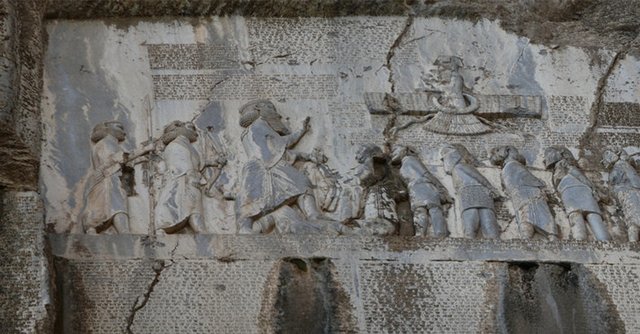
[ABOVE: The Behistun Inscription, in the Kermanshah province of modern Iran]
This is a long text on Achaemenid history, and today stands as the only royal inscription which has recorded key, places, dates and facts. Engraved into a side of Mount Bisitun, giving it its name, 66 metres off of the ground, Behistun derives from the old Persian "Baga-stāna", meaning "the place where the gods dwell", as mountains were deemed as sacred to the Persians. The inscription primarily commemorates Darius' several famous military victories, but it also describes how Ahura Mazda, the key deity of Zoroastrianism, supposedly chose Darius himself to dethrone the "usurper" Bardiya to save the Persian Empire. A depiction of Darius on the rock surface shows his boot on the usurper's neck. As stated on the inscription, once Darius has crushed the usurper that he claimed to be called Gaumata, he set about crushing rebellions across the empire, and expanding its borders to what would be its territorial height.
A WELL EXECUTED LIE?
Darius, the son of Hystaspes, was now crowned Shah of Persia. With thanks to Cyrus and Cambyses, all people’s of Asia - except the already-allied Arabians - were now his subjects. Take all of what I've typed with a pinch of scepticism though; more modern evidence has since come forward claiming that the usurper Bardiya was in fact the legitimate son of Cyrus, and thus the rightful claimant to the Persian throne; the evidence provided in this blog has come from ancient sources like the Greek historian Herodotus and from Darius himself, yet Darius may have in fact have pulled off one of the greatest political deceptions in history, illegitimately claiming the throne for himself and making up the story of Cambyses' descent into insanity. The theory is still in the air today and it remains a deeply intriguing one, and the story overall was, to me, worthy of getting its own blog.
Either way, Darius was as of now Darius I, and in the next blog, we will look at his reign, the ascent of Zoroastrianism, the construction of a new capital city, and the expansions into Europe that will eventually lead to the titanic clashes between the Persians most notable opponents - the Greeks will be back.
Stay tuned.
SOURCES
• Herodotus's "The Histories"
• Oswyn Murray's "Early Greece"
• Nic Field's "Thermopylae 480 BC"
All images used are license-free
YOUTUBE LINK
I do NOT own this video
Kings and Generals's "Darius I and the Greatest Lie in History"
This has been the sixth part in many blogs on the Achaemenid Empire. Go and check out the rest if you haven't already:
THE ACHAEMENID PERSIAN EMPIRE
https://steemit.com/hive-133974/@oo7harv/the-persian-empire-history-s-first-superpower
CYRUS THE GREAT 1
https://steemit.com/hive-133974/@oo7harv/cyrus-the-great-conquests-of-media-and-lydia
CYRUS THE GREAT 2
https://steemit.com/hive-133974/@oo7harv/cyrus-the-great-2-conquest-of-babylon-and-his-downfall
CAMBYSES II Part 1
https://steemit.com/hive-133974/@oo7harv/cambyses-ii-heir-to-cyrus-the-great-530-522-bc-part-1
CAMBYSES II Part 2
https://steemit.com/hive-133974/@oo7harv/cambyses-ii-the-mad-persian-shah-530-522-bc-part-2
PERSIAN PROVERBS
https://steemit.com/quotes/@oo7harv/persian-proverbs
THE HISTORY COMMUNITY
https://steemit.com/created/hive-133974
All feedback - positive and/or critical - is appreciated!
Don't forget to rate this post and leave a tip if you enjoyed it
Thanks for reading :)